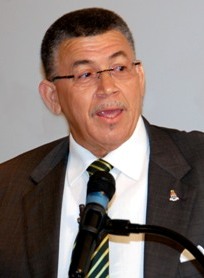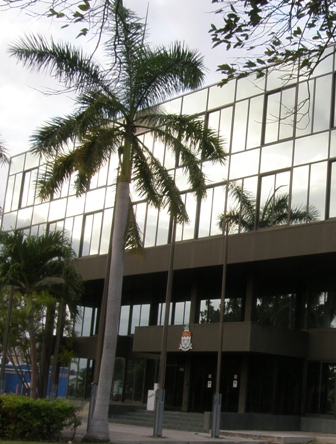Archive for December 10th, 2010

Mac’s first steps to recovery
 (CNS): Following some 250 suggestions from more than a dozen organisations and the wider public, the premier announced a stimulus package on Thursday evening that commentators are likely to say falls short when it comes to kick-starting the local economy. He said the measures were preliminary moves that had the potential to benefit the economy in the short term. Announcing a possible reprieve on loan payments at some banks, a duty reduction on some unspecified goods by unspecified amounts and immigration changes, the premier said that apart from funding the clean-up campaign to give people temporary work, it should be the private sector that drove job creation not government.
(CNS): Following some 250 suggestions from more than a dozen organisations and the wider public, the premier announced a stimulus package on Thursday evening that commentators are likely to say falls short when it comes to kick-starting the local economy. He said the measures were preliminary moves that had the potential to benefit the economy in the short term. Announcing a possible reprieve on loan payments at some banks, a duty reduction on some unspecified goods by unspecified amounts and immigration changes, the premier said that apart from funding the clean-up campaign to give people temporary work, it should be the private sector that drove job creation not government.
Confirming a number of changes to immigration policy that would affect high net worth people and foreign investors, as well as lifting visa requirements for Chinese and Jamaicans, the premier offered no news on significant wider changes, in particular to the rollover policy. There was also no mention of the reduction in permit and trade and business licence fees for small businesses, which the premier had previously hinted at.
Bush said a package on attracting physical presence financial services would be announced next year. “In collaboration with key financial sector stakeholders, a promotional strategy to encourage physical presence in financial services operations will be unveiled in the first quarter of 2011,” the premier said in his address to the country.
“This strategy will, at the very least, bring our jurisdiction on par with our competitors in terms of international promotional and marketing efforts. The success of this promotional strategy will not only address what is known as the ‘substantial presence’ issue but it will also create new white-collar jobs by supporting top quality organisations to combine their talent with the talent present in the Cayman Islands.”
He confirmed the introduction of a special one to five day temporary permit for those business travellers visiting for legitimate business purposes. He further revealed that in an effort to become more customer friendly, procedures at the airport were being reviewed so those attending business meetings would be “greeted by a truly welcoming atmosphere”.
Announcing stimulus for tourism, he said government would develop and implement strategies to increase target market visitor arrivals, improve the tangible and intangible visitor experience, improve Spotts Dock and develop a private and public strategy for national beautification. He also stated that Cayman Airways and the Department of Tourism were now working in close alignment to make the best use of the national airline and to work with sports organisations to develop a sports tourism strategy.
Despite the recent setback over the George Town port, the premier pointed to the cruise berthing development as a high priority project.
The government was also moving ahead on facilitating the Dr Devi Shetty’s hospital project, he noted, which, along with the resumption of the school projects as well as a new project to renovate the primary schools, would create jobs.
“Under my government’s stewardship, the recommencement of the new high schools project will provide much needed additional stimulus to the struggling construction industry,” Bush said. “Of particular note is the Ministry of Education’s innovative approach, which will result in some 70 construction works packages being tendered this financial year. These packages are worth approximately $14 million dollars. This approach will result in a wide range of contractors, large and small, benefiting, not just a select few. This will be a welcome relief to the many hard working Caymanian families who rely on the construction industry for their livelihood.”
Bush went on to say that the announcement was an outline of the short-term measures selected by the government. “Some of them will require specific details to be approved by Cabinet. Others will need further discussion with the private sector to ensure the maximum benefit is realized,” he added. “Nevertheless, my government will pursue these short-term stimulus measures with the urgency that our economic and financial situation demands. It will take time to see the full results. But we must stay the course if our efforts are to bear good fruit. There will be bumps and obstacles in the way, but we must overcome them. Nothing good comes easy.”
The premier went on to say that he would be speaking to the nation again before Christmas and would have more details on the stimulus in the New Year.

CS fat cats thin on ground
 (CNS): Contrary to some perceptions in the private sector, this year’s human resources report on the civil service has revealed that very few public servants are getting fat on the public purse. Almost a quarter of the country’s civil servants earn less than $30,000 per annum and over 70% earn less than $50,000. Only 86 workers on the public payroll earn $100,000 and over, and only two earn over $200,000. The report reveals, however, that despite the continuing recruitment cuts and government efforts to reduce the headcount, the number of public servants did not fall significantly over the 2009/10 financial year. On 30 June 2010 there were 3,687 civil servants, only 69 less than the 3,756 in June 2009.
(CNS): Contrary to some perceptions in the private sector, this year’s human resources report on the civil service has revealed that very few public servants are getting fat on the public purse. Almost a quarter of the country’s civil servants earn less than $30,000 per annum and over 70% earn less than $50,000. Only 86 workers on the public payroll earn $100,000 and over, and only two earn over $200,000. The report reveals, however, that despite the continuing recruitment cuts and government efforts to reduce the headcount, the number of public servants did not fall significantly over the 2009/10 financial year. On 30 June 2010 there were 3,687 civil servants, only 69 less than the 3,756 in June 2009.
There are a further ,2194 people working in statutory authorities and government companies that are also paid from the public purse, leading to a total of 5,881 people dependent on government for a living.
The report was laid on the table of the Legislative Assembly on Thursday morning by Deputy Governor Donovan Ebanks, who admitted that the decline in numbers was not happening as quickly as he had hoped.
“We have to drive down, more aggressively, the size of the overall organisation,” Ebanks told MLAs as he presented the report, adding that government was committed to cutting the cost of the public sector. He did, however, point out that calls to cut the top earnings as a way of reducing the cost of the civil service would achieve little impact, given how few were revealed to be in those top earning grades. Most civil servants, he noted, were in the lower earning brackets.
Ebanks also touched on the sensitive issue of those in the service that were over sixty years old and still in post. The deputy governor said that around 5% of public servants were at retirement age, and as difficult as it was for those who believed they were still healthy and experienced enough to carry on working to step down, it was the only way that young people would have the opportunity to start their careers.
“It’s a sensitive issue for those who want to carry on, but the flip side is the need to give young people a start,” he said, adding that some people had already had some 40 years “in the trough” and needed to give others a chance. The report also reveals that there is one employee over the age of 80 still working and 181 people are aged between 60 and 80 years old. The vast majority of civil service employees are aged between 30 and 55 years.
More than 72% of civil servants and some 74% of those working in other government entities are Caymanian, according to the report, with the continuing increase of Caymanians in the public sector over the last ten years. There are only five departments in core government where more than half of the work force is not Caymanian, whereas seven departments employ 100% Caymanian staff and more than half of the 57 departments have an 80% or more Caymanian workforce.
While men still dominate the senior positions in the public sector, 53% of the overall workforce is female but women account for the vast majority of low paying positions.
Although Caymanians account for the greater percentage of employees, the service employs workers from some 37 other nations. Jamaicans account for the largest percentage of non-Caymanian workers at 12.6%, and alongside the governor there are 168 British civil servants, accounting for 4.6% of the working population. Although workers from the wider Caribbean make up the greater percentage of foreign civil servants, the public sector employs people from as far afield as Denmark and Zambia.